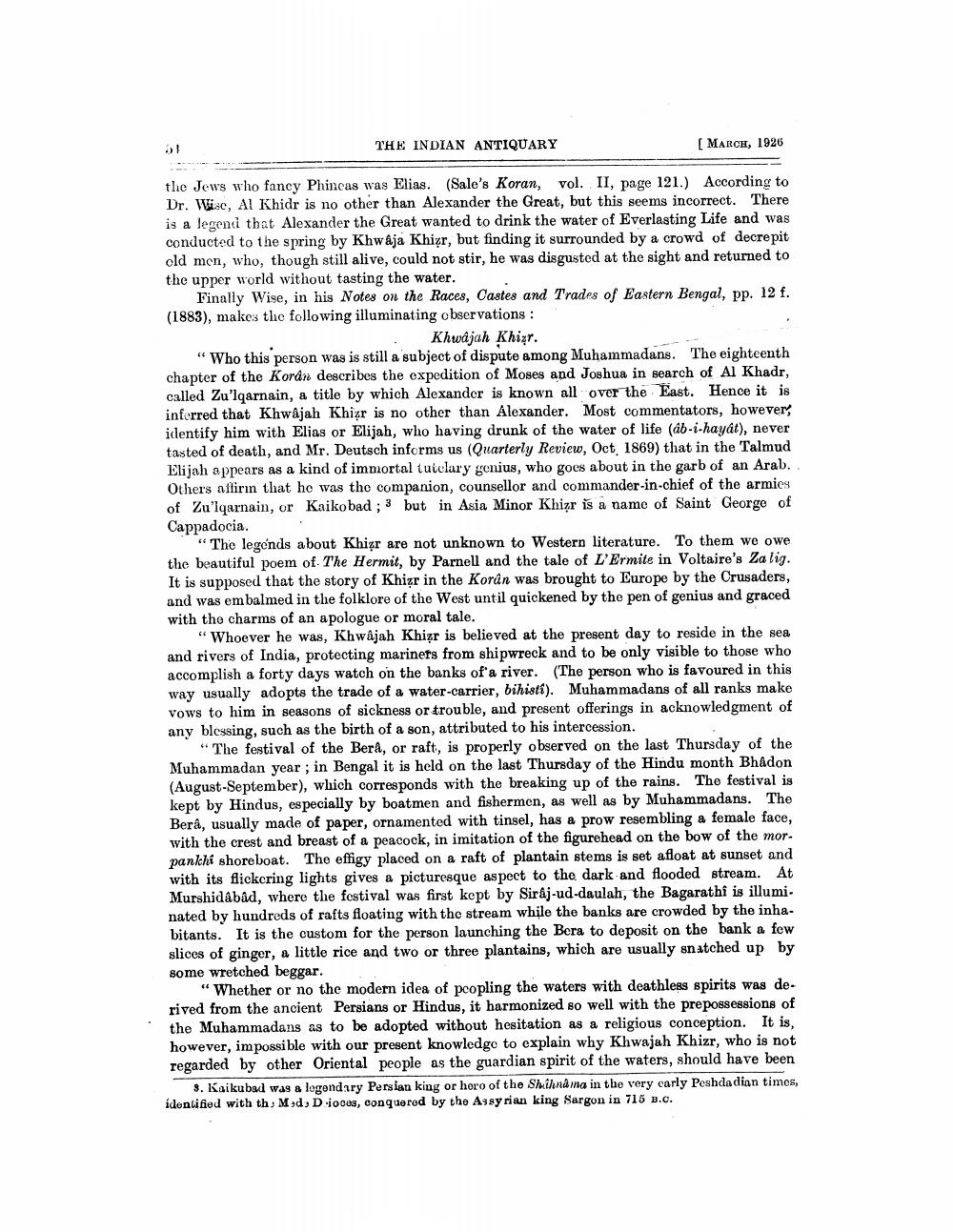________________
:)
THE INDIAN ANTIQUARY
[ MARCH, 1926
the Jews who fancy Phincas was Elias. (Sale's Koran, vol. II, page 121.) According to Dr. Wise, Al Khidr is no other than Alexander the Great, but this seems incorrect. There is a legendi that Alexander the Great wanted to drink the water of Everlasting Life and was conducted to the spring by Khwaja Khiềr, but finding it surrounded by a crowd of decrepit old men, who, though still alive, could not stir, he was disgusted at the sight and returned to the upper world without tasting the water.
Finally Wise, in his Notes on the Races, Castes and Trades of Eastern Bengal, pp. 12 f. (1883), makes the following illuminating observations:
Khwajah Khixr. “Who this person was is still a subject of dispute among Muhammadans. The eighteenth chapter of the Koran describes the expedition of Moses and Joshua in search of Al Khadr, called Zu'lqarnain, a title by which Alexander is known all over the East. Hence it is inferred that Khwajah Khiyr is no other than Alexander. Most commentators, however, identify him with Elias or Elijah, who having drunk of the water of life (ab-i-hayat), never tasted of death, and Mr. Deutsch informs us (Quarterly Review, Oct 1869) that in the Talmud Elijah appears as a kind of immortal tutclary genius, who goes about in the garb of an Arab.. Others affirm that he was the companion, counsellor and commander-in-chief of the armies of Zu'lqarnain, or Kaiko bad ; 3 but in Asia Minor Khir is a name of Saint George of Cappadocia
"The legends about Khiềr are not unknown to Western literature. To them we owe the beautiful poem of. The Hermit, by Parnell and the tale of L'Ermite in Voltaire's Za lig. It is supposed that the story of Khiqr in the Korûn was brought to Europe by the Crusaders, and was embalmed in the folklore of the West until quickened by the pen of genius and graced with the charms of an apologue or moral tale.
"Whoever he was, Khwajah Khiềr is believed at the present day to reside in the sea and rivers of India, protecting marinets from shipwreck and to be only visible to those who accomplish a forty days watch on the banks of a river. The person who is favoured in this way usually adopts the trade of a water-carrier, bihisti). Muhammadans of all ranks make vows to him in seasons of sickness or trouble, and present offerings in acknowledgment of any blessing, such as the birth of a son, attributed to his intercession.
" The festival of the Bera, or raft, is properly observed on the last Thursday of the Muhammadan year; in Bengal it is held on the last Thursday of the Hindu month Bhadon (August-September), which corresponds with the breaking up of the rains. The festival is kept by Hindus, especially by boatmen and fishermen, as well as by Muhammadans. The Berâ, usually made of paper, ornamented with tinsel, has a prow resembling a female face, with the crest and breast of a peacock, in imitation of the figurehead on the bow of the mor. pankhí shoreboat. The effigy placed on a raft of plantain stems is set afloat at sunset and with its flickcring lights gives a picturesque aspect to the dark and flooded stream. At Murshidabad, where the festival was first kept by Siraj-ud-daulah, the Bagarathi is illumi. nated by hundreds of rafts floating with the stream while the banks are crowded by the inhabitants. It is the custom for the person launching the Bera to deposit on the bank a few slices of ginger, a little rice and two or three plantains, which are usually snatched up by some wretched beggar.
"Whether or no the modern idea of peopling the waters with deathless spirits was de. rived from the ancient Persians or Hindus, it harmonized so well with the prepossessions of the Muhammadans as to be adopted without hesitation as a religious conception. It is, however, impossible with our present knowledge to explain why Khwajah Khizr, who is not regarded by other Oriental people as the guardian spirit of the waters, should have been
3. Kaikubad was a logondary Persian king or hero of the Shihnd ma in the very carly Poshdadian times, identified with th, M:d, Dious, conquerod by the Assyrian king Sargon in 716 B.C.




